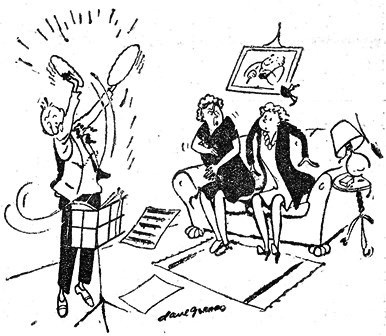
Vol. 1, No. 39 Published by India China Division, Air Transport Command October 11, 1945

From Bandoeng Base By ICD Mercy Flight Batavia, Java - An emergency mercy flight by an ICD C-54 to remove almost-starved American prisoners of war from Bandoeng, a Jap-occupied airfield 150 miles south of here, was revealed this week. When the first American aircraft, a division Skymaster piloted by Maj. L. W. Moomaw, Capt. Joseph F. Chuese and 1st Lt. Bobby M. Burns, arrived here to evacuate Americans, an American internee, Johnny Fagan, rushed up to the crew as they stepped from the cabin door. He pushed past the Japs who met the plane. "I've just come from Bandoeng," he said, "There are five American prisoners there. They're in pretty bad shape. Can you go get them? I'll go with you." The pilots never had heard of Bandoeng and the Japs at Batavia had no accurate information on the airfield there. The crew found the Bandoeng airfield in excellent shape, with ample runway for the C-54. A Jap colonel met the airplane, escorted the crew to a Jap major general in the terminal building and provided transportation to the prison camp to bring the Americans to the field. Within an hour and a half after the landing, the POWs were on their way to Batavia, Singapore and Calcutta - and home. |
60-Pointers, 24-Month Men
To Be on Way Home Shortly
Hq., Calcutta - Plans for ICD strength reduction now call for only 25 percent of the division's peak total to remain by the end of next month.
Ten thousand ICD officers and enlisted men are being redeployed to the U.S. this month, and space for 11,000 more has been requested from I-B Theater Headquarters for November, it was announced by the division personnel section Wednesday.
Bases Closing
All men, with the exception of radio operators, who have 70 points or 24 months' overseas time as of Oct. 1, are being placed on orders this month. If the November quota is granted, men with 60 points are to be on their way home before Dec. 1.
After men with point or overseas eligibility for return to the States have been released, entire personnel from closed bases will be released, with the exception of those with low points or little time in the Theater.
Officers being returned to the States during October include those in the non-rated group who are eligible on points. An additional requirement for rated officers is the completion of 750 Hump hours.
Assam Wing Folds
ICD bases which began closing out in September were Jorhat, Misamari, Chengtu, Loping, Yangkai and Jiwani. Those that will cease operations this month include Mohambari, Shamshernagar, Chengkung, Paoshan, Liuchow, Yunnanyi, Luhsien and Lufiang, which may be used as a China staging point in November. Bhamo, Kumitola, Myitkyina, Chanyi, Lalmanir Hat will halt operations in November.
Chabua will be used for deployment, and Tezgaon ships will stop Hump flights on Dec. 1. Kunming will function as a Hump base through November. Bombay will close out in December.
Personnel not eligible for redeployment will be sent from Assam and Bengal stations to Barrackpore, Karachi, Agra and Dum Dum.
First wing headquarters to cease operations will be the Assam wing, which will shut down Oct. 15. India wing will follow suit on Dec. 1. In China the wing headquarters will move to Shanghai between Oct. 15 and Nov. 15. A-1 reports that it will then operate at no more than one-half of its Oct. 1 strength. Bengal wing will begin closing in November. Both Barrackpore and Dum Dum will remain open until the first of the year, manned by low-point, few-month men.
80 Per Day
Of the ICD men leaving during October, 8,000 are from bases in the I-B Theater while the remaining 2,000 have been stationed in China. Those from the China Theater will leave by boat from Calcutta. All others will ship out of Karachi.
From Bengal wing, 1,156 men were flown to Karachi on Saturday and Sunday. An additional 400 from the Calcutta area left on Monday.
India wing stations, with the exception of Dum Dum, which is considered in the Calcutta area, will begin to ship men on Oct. 13 at the rate of 80 each day.
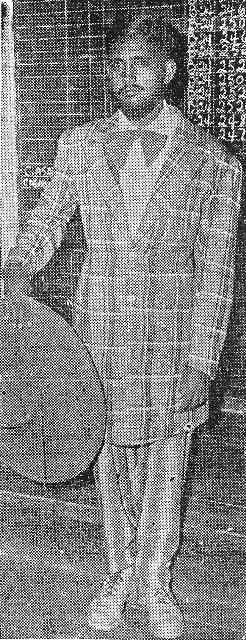 1306 BU, Karachi - Operations wallahs, who outfitted Sanowbar in the snazzy zoot-suit, are trying to convince their protege to go Hollywood and give
Charles Boyer a little competition. The operations "director of dusters," however, says it's no go - he's too fond of India!
1306 BU, Karachi - Operations wallahs, who outfitted Sanowbar in the snazzy zoot-suit, are trying to convince their protege to go Hollywood and give
Charles Boyer a little competition. The operations "director of dusters," however, says it's no go - he's too fond of India!
|
Fate, Postponement Saves
China GIs from Much Misery
Kunming - Fate has saved many GIs in the China Theater from misery, mangled limbs and maybe death - fate and the kind decision of the Allied commanders to postpone the date set for changing over to driving on the right-hand side of the road.
On Oct. 1, many men could look across the cool green hills of China with a new lease on life. This had been the date for the great change,
|
Greeted with greater appreciation than the invention of the Dribblwet drainage ditch for drowned-out dugouts, the decision was made some time ago but its true value was not realized until the morning of the first when men ascertained that they still could travel China's muddy-dusty lanes with only the normal amount of terror.
It is reported that the sole disgruntled party is the Ding Fod medal foundry. Apparently they had been planning to reap great profits from their new type battle star which had been designed as an award to men injured in the Great Change.
| ATC IN INDIA-CHINA |
To Offer Troops a Souvenir
A little black-and-yellow-covered booklet, "ATC in India-China," telling the history and the mission of the India-China Division with pertinent sidelights on the two countries, may be picked up by men leaving for the States when they get their orders.
Should no books be available with the orders, a copy can be procured at the POE.
In addition to the history of the division, the booklet describes the life of the personnel and is full of an artist's views of India and China. Other features include "ICD Today," "How The Hump Was Licked," "China-Side," "Down Under," and "The Home Stretch."
There is also a map showing the location of every ICD base, the air routes and the distances between bases. When telling the grandchildren about the war in ICD, this map should prove of great value.
|
|
CHUNGKING CHAPTERS . . .
Every time we came to a curve the Chinese driver would pick his nose. When he wasn't occupied with that hobby he was either looking backwards or fooling with the windshield. Figuring it all up, allowing for his nose and his ribs and this and that, he had his hands on the steering wheel about 20 to 25 minutes during the hour-and-a-half drive.
Maybe that doesn't sound too hair-raising, but it would if one realizes that it happened on the road between Chungking and the Peishiya airfield. More like a reptile than a road, it coils, recoils, uncoils, curves and twists around the mountains, going up and over, down and around. Sometimes the cars pass through the low hanging clouds atop the peaks and sometimes they jounce along through the rice paddies that line the inside of the little valleys. Most of this alley of indecision is so constructed that one can look ahead and see where he has been and where he is going at the same time.
Regardless of the narrowness of the lane and the fact there is no guard rail to keep vehicles from plunging over the steep sides, the road is a monument to the engineers and coolies who wheedled, worked and carved it out of the solid rock and mushy clay through which it passes.
If it weren't for the coolies that run alongside with their strawplatter hats and their shoulder-balanced loads, one almost can dream he is back in Colorado or Nevada, so steep and craggy is the countryside. It would seem that when God made the world he let the terrain conform, more or less, to a definite pattern and let the people have charge of the secondary changes such as homes, cities and standards of living.
After all, a mountain in Arizona looks just about the same as a mountain in China, except that in one there is likely to be developed coal mines, gold mines, good homes and fairly good living while in the other there is likely to be nothing but a few small clay and straw homes with smoke pouring from under the eaves and a bowl of cold rice inside for a meager subsistence.
At one place along the road coolies go riding past on coal carts that speed downhill on a narrow-gauge track. They look pretty silly just sitting there letting the cart go as fast as it wants to, never worrying lest they might have to stop in a hurry. Nor do they watch out for road crossings. If anything ever happened that called for a fast halt, there would probably be an awful mess of carts, coal and coolies scattered around the countryside.
CAVITIES . . .
Most of the rocky mountain-teeth that poke up into the sky are pitted with cavities. These are caves cut into the solid rock by the people and used as protection from the Japanese bombing raids during the early part of the war. The story of how the people of Chungking lived, worked and carried on business as usual from these dark, damp and musty caves is history.
Now the caves are still used for homes, storage places and abiding places for the local mountain yokels who haunt the nearby airfield like the gremlins used to do back in England.
3.2 . . .
Observant houseboys here might, as they clean out the wastepaper baskets and trash containers, perceive that the GI is on the rise. For, packed in with the other rubble, they find - of all things -beer cans! It is the first time many have sipped Stateside brew since they have been stationed in this never-never land.
They navy in Shanghai did not have any trouble finding the beer. And should, for some unexpected, unparalleled reason, the Whang Poo river go suddenly dry, they would still navigate their ships by merely calling all hands to the side.
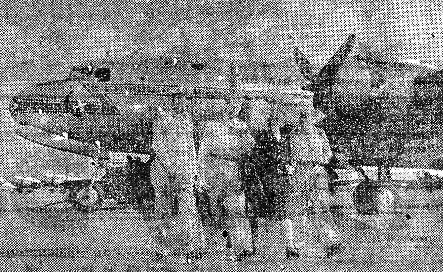 When ATC's round-the-world C-54 "Globester" arrived at Karachi on its inaugural flight with three of America's top-notch war correspondents aboard,
Col. Edward H. Holterman, CO of the 1306 BU, greeted them. On Col. Holterman's left are Paul Miller, Associated Press; Miss Inez Robb, International News
Service, and Frederick C. Othman, United Press. In the background is the Globester.
When ATC's round-the-world C-54 "Globester" arrived at Karachi on its inaugural flight with three of America's top-notch war correspondents aboard,
Col. Edward H. Holterman, CO of the 1306 BU, greeted them. On Col. Holterman's left are Paul Miller, Associated Press; Miss Inez Robb, International News
Service, and Frederick C. Othman, United Press. In the background is the Globester.
|
First Scheduled Global Run
Hits Washington On Time
Washington (ANS) - The ATC prepared to send its second regular around-the-world plane winging eastward last Friday after the first regular global flight ended on schedule Thursday night at national Airport.
Forty passengers on a C-54, the sixth used on the six-and-one-fourth-day flight, landed at 9:42 p.m., Eastern Standard Time. It flew the 2,500-mile hop from San Francisco in 13 hours. The global flight started at 3:58 p.m., (EST) on Sept. 28.
'Fastest Time'
The plane covered 23,279 miles in 149 hours and 44 minutes, including ground time of 33 hours and 21 minutes. It averaged a traction over 200 miles per hour flying time and about 155 miles per hour elapsed time.
Lt. Gen. Harold George, CG, ATC, termed the trip the "fastest world flight ever made near the Earth's greatest circumference." He said that in the future the Globester will stop at Stephenville in Newfoundland, at the Azores, Casablanca, Tripoli, Cairo, Abadan, Iran, Karachi, Calcutta, Kunming, Manila, Guam, Kwajalein, Johnston Island, Honolulu, San Francisco and St. Joseph, Mo.
This replaces the Bermuda stop with one at Stephenville. New stops included Johnston Island and St. Joseph.
100 Passengers
Twenty-one years ago, the Army's first around-the-world flight took 175 days over a shorter route. Over a route of only 14,824 miles, Howard Hughes and a crew of four, in 1938, made the flight in three days, 10 hours, 8 minutes and 10 seconds.
Besides the eight who went all the way on the initial Globester, approximately 100 passengers embarked and debarked en route. Thirteen different ATC crews flew at various stages.
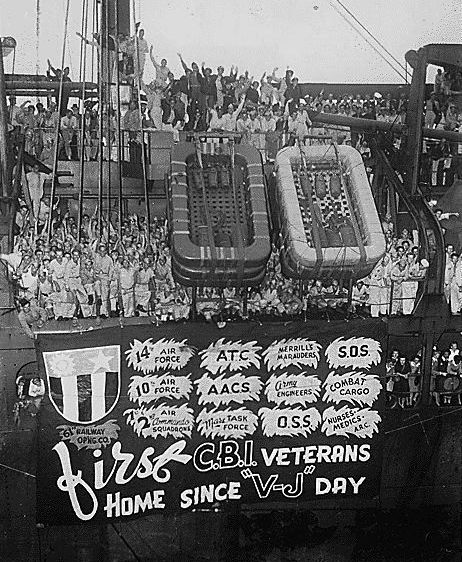 First India-Burma and China troopship to arrive in Uncle Sugar since V-J Day, the General Greeley docks in New York harbor. On board are
2,735 veterans, including men of the ICD, who departed from Calcutta Aug. 31 and reached the U.S. 25 days later. (Press Association, Inc., photo.)
First India-Burma and China troopship to arrive in Uncle Sugar since V-J Day, the General Greeley docks in New York harbor. On board are
2,735 veterans, including men of the ICD, who departed from Calcutta Aug. 31 and reached the U.S. 25 days later. (Press Association, Inc., photo.)
|
Comcar Transports Were First Planes
To Reach Shanghai
Hq., Calcutta - Planes of the 11th Combat Cargo Squadron of the Tenth Air Force and not an ICD C-54 were the first American transports to land at an airport in Shanghai, Maj. Frank M. Haynie, 11th CO, wants it known.
Refuting a statement in the Sept. 13 Express that Lt. Col. Charles H. Blanchard was in the first Yank transport to hit a Shanghai runway, on Sept. 2. Major Haynie declared two Comcar C-46s landed on Aug. 19, carrying relief teams with medical supplies for internees and war prisoners. The planes carried nearly ten tons of food, clothing and medicine.
Hump Express regrets its inadvertent error. The Tenth AF PRO apparently didn't have this paper on its press release mailing list.
ICD Air Crews, Maintenance Men,
Get Commendation
Hq., Calcutta - ICD air crews and supply and maintenance personnel which participated in the recent movement of 28,672 Chinese 94th Army troops by Bengal base planes from Liuchow to Shanghai were commended last week by Lt. Gen. George E. Stratemeyer, CG, AAF, China Theater.
"The completion of this move 24 days ahead of schedule and the movement of such high tonnage and number of personnel in a total of 21 days is a high tribute to your organization and operational efficiency," Gen. Stratemeyer stated.
Gen. H. H. Arnold also sent his personal congratulations for "the superior manner in which the officers and men," in the ICD accomplished the mission.
The project, made entirely with C-54s, also carried 1,143 tons of equipment into occupational areas in China.
Nip Plane ‘Strip’ Puts Damaged C-54 in Air
Singapore - When an ICD C-54 damaged a wingtip on the over-crowded airfield here the other day, it appeared the flight of American internees to Calcutta would be delayed until parts could be flown from Calcutta.
Maj. R. C. Thomas, ICD engineering officer at Singapore, started inspecting Japanese aircraft strewn about the airstrip. On the third plane he found just what he needed - a strip of metal just the right length, weight and design.
A few tools, a bit of American ingenuity, plenty of labor and three hours - and the C-54 was ready to go.
Commercial Outfits Furnish Top Billets For GIs in Batavia
Batavia, Java - American forces here are living in the best that General Motors and Socony Vacuum companies can buy.
One of the internees freed was the former head of the General Motors Corp. in the Indies and he invited the ATC men and other Americans here to stay at his place. Just across the street was the Standard Oil Company's mansion, also unoccupied. So the enlisted men moved into one mansion and the officers into another.
The mess hall is a large dining room with glass-topped tables, plush chairs and inch-thick carpets. A former hotel manager in Batavia, just freed, is the "mess sergeant." There are huge bedrooms with individual baths, a game room with billiard table and an excellent small library. Most of the GIs admit they never lived in anything quite so pretentious.
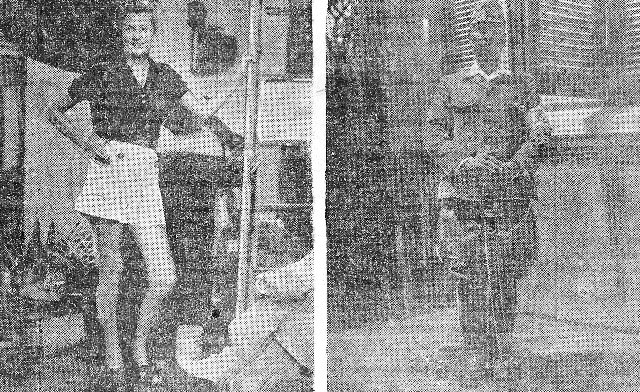 For the many internees in Batavia prison camps Jap surrender meant freedom and a new chance at happiness and health. For the Japs, it meant a dose
of the treatment they gave to others for so long. On the left is a Dutch internee who spent three and one-half years in the squalor of a Nip internment
camp. On the right stands one of the Japs who saw that she had little to eat and as much privation as he could enforce. (Photos by Lt. L. M. Blakemore.)
For the many internees in Batavia prison camps Jap surrender meant freedom and a new chance at happiness and health. For the Japs, it meant a dose
of the treatment they gave to others for so long. On the left is a Dutch internee who spent three and one-half years in the squalor of a Nip internment
camp. On the right stands one of the Japs who saw that she had little to eat and as much privation as he could enforce. (Photos by Lt. L. M. Blakemore.)
|
Freedom Is Aim of Java; Dutch Silent
Through Batavia Sector
By T/Sgt. C. A. Zeilinger
Batavia, Java - There isn't much semblance of peace in Java. As the disarmament of the Japanese and the occupation by British and Indian forces begins, the atmosphere becomes increasingly charged with the threat of revolution.
Factions that struggled to crush the power of the Jap forces here during the war now are struggling equally hard to resist the return of Dutch rule for the Indonesians. The entire island is a seething mass of political unrest and confusion.
There has been no large-scale fighting or rebellion but the independent Indonesian republic, formed Aug. 17, has not yet been challenged by the Dutch.
Threaten Europeans
However, there is increasing evidence of action to come when the Dutch attempt to quell the rising tide of nationalism. Every night there are sporadic outbursts of violence. Mass meetings take place in darkened streets, sometimes ending in riots and shooting.
The bi-color flag of the Indonesian republic is flown defiantly over government buildings and individual establishments. Citizens in sympathy with the nationalists wear white and red badges and congregate in front of government houses, shouting threats at all Europeans.
Statues of former Dutch leaders have been boarded over. On street cars and buildings quotations from the U.S. Declaration of Independence are painted in foot-high letters. Indicative of the spirit of the nationalists is their slogan: "We do not ask for freedom. We demand it!"
Stay-at-Homes
Just outside Batavia guerillas stand ready for any eventuality. If the demands of the nationalists are not met they threaten to cut off railroads, communications and the water supply.
Inside the city no Europeans go abroad at night. Frequently the lights are shut off throughout the city and Japanese and British guards alert the population. As yet, nothing has occurred during these blackouts except looting. Europeans, however, sit in their darkened homes, not knowing what to expect. The independence movement is well aware of the effect this has upon the continentals living in Batavia.
Small but dangerous terrorist groups are causing some bloodshed in Batavia. An American vehicle, accidentally passing a road barrier, was almost demolished in a rain of spears, knives and rocks hurled by infuriated partisans. No one was hurt although spears penetrated windows and lodged in the upholstery inside. Though not openly hostile to Americans, these small groups resent the presence of any foreigners.
|
Building Army
The new Indonesian republic, under the hand of Pres. Sukarno, an engineer, is busy spreading propaganda and strengthening its hold on the population. The Jap military government is being dissolved by the incoming British, but neither the Japanese nor the British military governments are in complete control of the city. This gives Pres. Sukarno and his satellites an excellent chance to set up the form of government they wish. Once it is set up, they will defy any other regime.
To back up their contention they are building a well-trained army. They boast an army of 200,000 in training and ability to pit 500,000 troops against their "suppressors." They further claim that if a struggle for independence becomes necessary they will have the support of such groups as the Black Fan Society and the communists.
No Clear Policy
From all this turmoil no clear policy as yet has evolved. The Dutch have remained conspicuously silent. Part of the island is under British military government and part under Japanese control. Presumably the Dutch and the nationalists are waiting until they can deal through a centralized agency before they open negotiations.
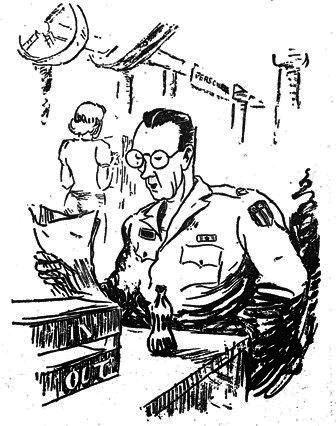 "... And just to think of it: MY baby, only ONE month in CBI and ALREADY he has the Presidential Citation ribbon and a BATTLE star!
Please, darling, DO be careful, crawling through those awful, ikky jungles, with those terrible, TERRIBLE Japs."
"... And just to think of it: MY baby, only ONE month in CBI and ALREADY he has the Presidential Citation ribbon and a BATTLE star!
Please, darling, DO be careful, crawling through those awful, ikky jungles, with those terrible, TERRIBLE Japs."
|

Around the World
ATC's "Globester," which circles the world on a scheduled flight in 149 hours and 44 minutes elapsed time, including stops, marks a milestone in history.
Since Jules Verne wrote "Around the World in 80 Days," in 1872 - at which, incidentally, the world scoffed aloud - the idea of circling the earth in the fastest possible time has been one of man's most fanciful dreams.
In 1889, Nellie Bly, New York newspaper-woman, went around the world in 72 days. That started a series of round-the-world speed records of adventurous travelers by boat, train and motor car. John Henry Mears cut the record to 35 days - half of Nellie's time - in 1913.
The first round-the-world airplane flight was made by U.S. pilots in 1924 - 14 days and 15 hours flying time. The fly in the ointment was, however that the trip took 175 days altogether, owing to weather, mechanical trouble and other delays.
Mears took another crack at it in 1928 and made the circuit by boat, plane and train in 23 days. The next year the famous German dirigible "Graf Zeppelin," lowered Mears's record to 20 hours.
Then Wiley Post came along. In 1931 he flew the "Winnie Mae" around the globe in 8 days, 15 hours, 51 minutes, but he traveled only 15,471 miles along the northern route. Two years ;later Post again piloted the "Winnie Mae" over the northern circumference, this time in 7 days, 18 hours and 49 minutes. Again his route was only 15,000 miles.
In 1936 three N.Y. newspapermen decided to test the fastest globe-circling commercial flying time. By using land planes, seaplanes and dirigibles, H. R. Ekins of Scripps-Howard, managed to get back to Lakehurst, N.J., in 18 days, 11 hours and 14 minutes. (He also was reported to have said he would never do it again.)
Two years later Howard Hughes hung up a real speed record over a short 14,824-mile route which he covered in 3 days, 19 hours and 8 minutes. His was a purely technical flight.
On a strictly military flight, Capt. J. W. Chapman, Jr., of the AAF in 1941 flew from Washington to Washington via Moscow in 5 days, 1 hour and 55 minutes' flying time.
Now ATC goes round-the-world in deluxe style on schedule every week - in less than five days actual flying time - a little more than six days total elapsed time - and flies 23,279 miles to do it.
The C-54 flights which span the globe on clock-like schedules are merely "routine," take place every day. That's why they mark a milestone in history.
|
A Friend in Need
A recent incident in ICD illustrated the importance of the human touch which so often is lacking in the army.
Men in one tent in a headquarters squadron were quarantined when the illness of an occupant was diagnosed tentatively as a serious contagious disease. The others were extremely jittery as they faced confinement and began to sweat out possible contraction of the disease.
The squadron CO visited the tent, calmed the men with his cool reassurance and kindly manner. Later he carried over a case of beer, ice to cool it, and sandwiches so the men could have a little party in lieu of the shindig they were missing at the EM club that night.
Next morning the CO returned, assuring the men again there was "nothing to worry about." He made several visits, lugging an armful of baseball equipment on one trip, in response to a hint that the men would like to toss around a ball. Later he came back with their mail.
That afternoon the men were released from quarantine when their tentmate's case was diagnosed as a non-contagious ailment - just before the CO would have kept his promise to bring the men a radio to help while away the hours.
Such thoughtfulness did more for the morale of these men - and the others in the squadron to whom the word was spread like wildfire - than anything short of a trip home. Judged by the war's standard, with its smashing military successes, its atomic bombs and its naval blows, the CO's activities perhaps could be dismissed as a trivial thing. But to the men it affected, it was something big, something they'll never forget, something which gave him stature few achieve.
They'll always remember that CO as their personal friend, a real leader, a man bigger than germs and red tape and regulations and bulletin board notices.
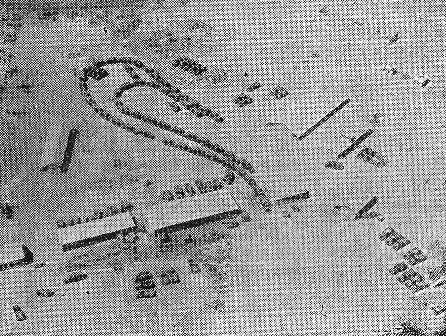 Aerial view of the first convoy leaving the staging area for Karachi port, a move that will be repeated frequently as tens of thousands of soldiers
leave for the U.S.
Aerial view of the first convoy leaving the staging area for Karachi port, a move that will be repeated frequently as tens of thousands of soldiers
leave for the U.S.
|
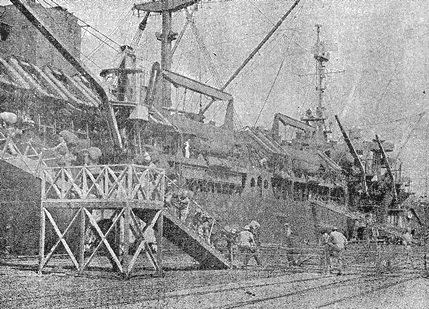 With duffle bags crammed with required GI equipment and last-minute souvenirs from the Orient, soldiers walk up the gangplank, leaving India soil
for what most hope is the last time. Men from India, Burma and China depart this port.
With duffle bags crammed with required GI equipment and last-minute souvenirs from the Orient, soldiers walk up the gangplank, leaving India soil
for what most hope is the last time. Men from India, Burma and China depart this port.
|
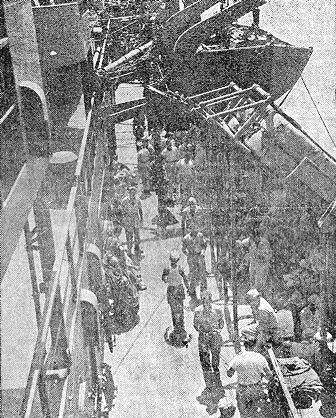 After dropping their equipment on bunks, the men return to the deck to find a spot in the sun or in the shade and resume the shipboard life most
left over two years ago.
After dropping their equipment on bunks, the men return to the deck to find a spot in the sun or in the shade and resume the shipboard life most
left over two years ago.
|
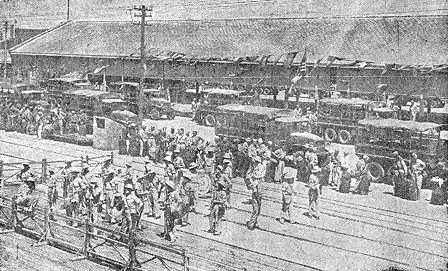 An army band, present at the embarkation of the first 3,100 GIs going Stateside on the General MacCrae, rests while soldiers unload from
the truck convoy. The longing looks some bandsmen are casting at the ship hint they, too, would like to be headed for Uncle Sugar.
An army band, present at the embarkation of the first 3,100 GIs going Stateside on the General MacCrae, rests while soldiers unload from
the truck convoy. The longing looks some bandsmen are casting at the ship hint they, too, would like to be headed for Uncle Sugar.
|
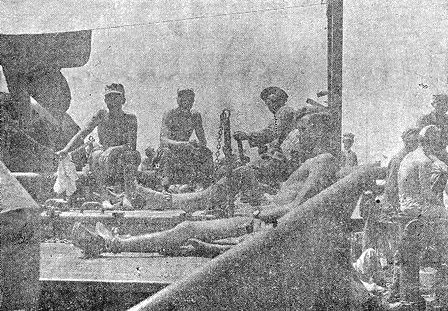 Although living conditions aboard homebound ships are reputed to be much better than on those coming over, comfort on a troop ship still is a
hard-to-find luxury. These men have settled for one of the best relaxations that shipboard life can offer - sunbathing on deck. At the same time
they get a chance to do more daydreaming about their homecoming.
Although living conditions aboard homebound ships are reputed to be much better than on those coming over, comfort on a troop ship still is a
hard-to-find luxury. These men have settled for one of the best relaxations that shipboard life can offer - sunbathing on deck. At the same time
they get a chance to do more daydreaming about their homecoming.
|
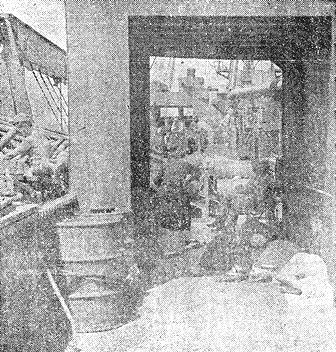 Not in the least excited about prospects of a 21-day trip to New York, these GIs fell asleep on deck while the ship was still docked. Three weeks
at sea give the men plenty of time to relax and rest up for all the Stateside fun ahead for them.
Not in the least excited about prospects of a 21-day trip to New York, these GIs fell asleep on deck while the ship was still docked. Three weeks
at sea give the men plenty of time to relax and rest up for all the Stateside fun ahead for them.
|
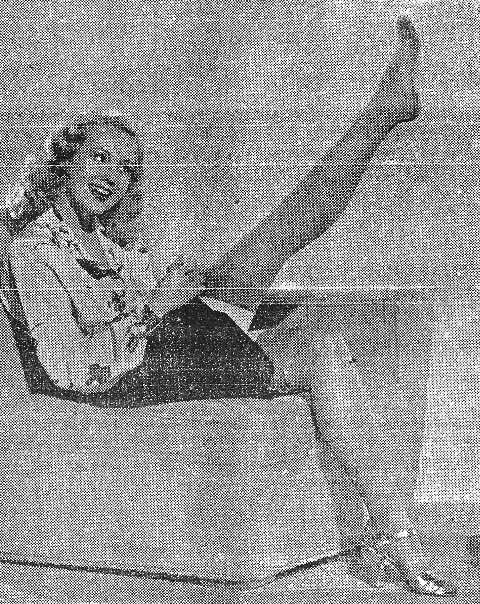 Bobby sox give way to nylons as Virginia Mayo, leggy Sammy Goldwyn lovely, tries on a pair of the first dozen to be produced since the war ended.
Geez, ain't reconversion wonderful?
Bobby sox give way to nylons as Virginia Mayo, leggy Sammy Goldwyn lovely, tries on a pair of the first dozen to be produced since the war ended.
Geez, ain't reconversion wonderful?
|
Reunion Held with Folks After City is Freed From Japs
Shanghai - As fully-armed Jap soldiers watched stoically, Lt. Leonard Komor, of the Bengal wing, stepped out of the first Cannon project C-54 to fly into Shanghai.
He looked around the airbase, located a Chinese with a car, and in a few minutes was speeding into the city - for the first time since November, 1941, when he barely escaped the arrival of the Nips. His parents, Mr. and Mrs. Paul Komor, had stayed in Shanghai throughout the Jap occupation, and he had had no word from them since he left.
Another Khaki-Clad
It was with mixed feelings, Komor related, that he approached his parents' house. Dismissing the car about a block away, he walked up to the building, noting the changes in the familiar yards and houses.
His father, Komor said, had seen him approaching. From a distance he was just another khaki-clad officer, so Mr. Komor prepared for the worst, since uniforms in that section of the city usually meant trouble. When his father recognized him, he nearly fainted - then his dad ran from the house to meet him, while his mother watched from the window. For all three, the reunion was the end of four years of agonized uncertainty, a promise of happy days clear of worry, free of the hated Japs.
Born in Shanghai, as were his parents, Komor attended school in the city until 1936, when he went to the States to enroll in the University of California. He graduated in 1940 with a degree in engineering, and returned to Shanghai as engineer for the American Power Company, bringing his American citizenship papers with him. Not quite a year later he decided to return to his adopted country - he had smelled trouble brewing in Shanghai, and believed he could help more if he were in the States. So he booked passage on a Dutch cattle ship for Manila, and bought a ticket on the Dollar Line "President Coolidge," bound for San Francisco.
Fluent Chinese
The President Coolidge left Manila in convoy. Prepared for any eventuality - it was Nov. 27, 1941 - the convoy took a zig-zag course through the Java Sea, by the Dutch East Indies, and far south of the equator. News of the Pearl Harbor attack, radioed to the convoy, left the passengers shocked and doubting. But there were no doubts left when the Coolidge sailed into Pearl Harbor Dec. 14.
Arriving in San Francisco a few weeks later, Komor enlisted in the Army Air Forces as an aviation cadet, and pending his call to training took a job with Pan-American Airways as flight engineer. In October, 1942, he got his orders, and soon was assigned to the 14th Service Group, an all-Chinese unit, at Venice, Fla., where he had ample opportunity to exercise his fluent Chinese. Two years later he was transferred to the ATC, and in December of '44 shipped to India to fly ICD routes.
Komor's father, a Hungarian citizen, had been working for the Allied cause long before war broke out. When the Japs entered Shanghai, he was on the list of espionage suspects, and imprisoned for six weeks at the infamous Japanese Bridgehouse. After the Nips were unable to prove their case, Mr. Komor was released, and he and his wife were molested no more during the Jap occupation.
The flier plans to return for a longer visit after he is released from the Army.
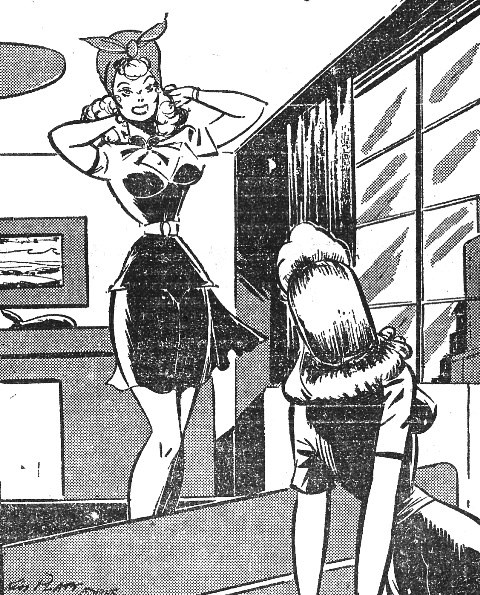 "The factory foreman just told me I am no longer essential."
"The factory foreman just told me I am no longer essential."
|
Dum Dum Radio Op Helps
Save ‘Lost’ Gasless B-24
1305 BU, Dum Dum, India - It was cloudy, overcast night when S/Sgt. William H. Korn, radio op on a Dum Dum-based C-47, got a "Mayday" on his air-ground frequency.
The SOS came from a bomb group B-24, lost in the vicinity of Lahmanir Hat. With all radio facilities except the liaison set inoperative and only 45 minutes of gas in the tanks, the B-24 was forced to make a visual search for the field.
Contact was made with the ground station at 1326, but attempts to give radio signals and to bring the lost ship in by use of flares and sandra light failed.
F/O Richard D. Likens, pilot of the C-47, had been carrying on a visual search for the B-24 since the first message came in. A few minutes after the Liberator's radio op reported, "I don't know what's going to happen, but everyone's putting on chutes," Likens broke through the overcast at 10,000 feet and spotted the navigation lights of the lost plane about 25 miles northwest of the field.
He "lined up" to give the B-24 a bearing, and then went down to circle the field and flash his landing lights. The Liberator landed safely, with all gas gauges registering "zero."
HUMP EXPRESS is the official newspaper of the India-China Division, Air Transport Command, APO 192, c/o Postmaster, New York, N.Y., and is published by its Public Relations office. Camp Newspaper Service and Army Newspaper Service features are used, reproduction of which is prohibited without permission of CNS and ANS, 205 East 42nd St., New York, 17, N.Y. Other material is submitted by staff members, ICD-ATC base Public Relations sections and other soldier correspondents. Printed weekly by the Hindusthan Standard, 3 Burman St., Calcutta, India, and distributed each Thursday. Passed by U.S. Press Censor for mailing.
| Military transport schedules over India for cargo, personnel and mail ... maximum tonnage of essential war materials over the Hump ... movement of troops and supplies in support of tactical operations in China ... evacuation of the sick and wounded - these are the missions of ICD-ATC. |

OCTOBER 11, 1945
Original issue of HUMP EXPRESS shared by Barbara Skinner Lipiew
Copyright © 2018 Carl Warren Weidenburner
TOP OF PAGE PRINT THIS PAGE ABOUT THIS PAGE E-MAIL YOUR COMMENTS
PREVIOUS ISSUE HUMP EXPRESS BASE NEXT ISSUE
| This page dedicated in memory of CBI veteran George C. Skinner |
